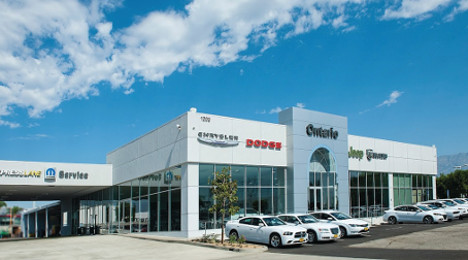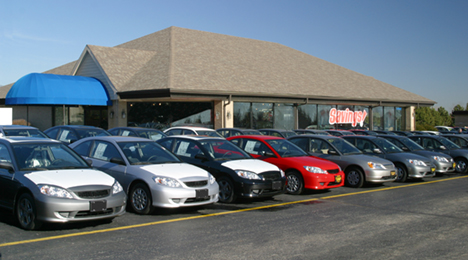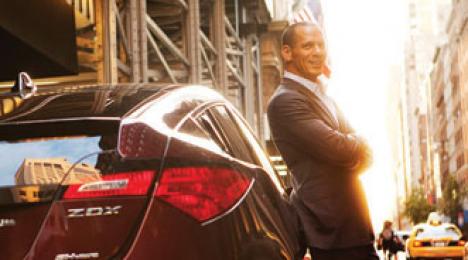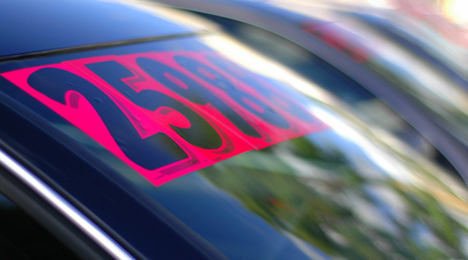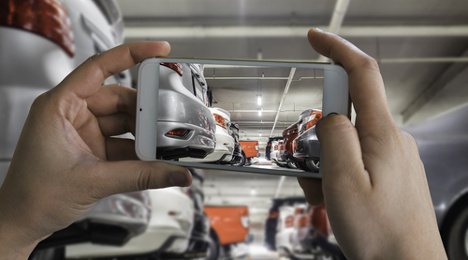Of the 2,600 Chrysler, Jeep, Dodge, Ram and FIAT dealerships in the U.S., Fiat Chrysler Automobiles announced that 387 earned certification as 2017 Customer First Award for Excellence winners for providing exceptional sales and service experience.
FCA said it created the award with its dealer partners and J.D. Power to improve sales and service experience, employee training and facility conditions at its U.S. dealerships.
"We now have triple the amount of winning dealerships that may proudly market themselves as Customer First Award for Excellence achievers,” Al Gardner, head of Dealer Network Development at FCA, North America said in a news release.
“Consumers will know that they are in a Customer First dealership from the logos, but more importantly, they will experience the evolution of these elite stores."
Each year all 2,600 dealerships are eligible to earn the award.
To be considered for the award dealerships must demonstrate stringent goals in five core "pillars" that have been outlined:
-
Facility Certification – Facility provides a clean, comfortable environment for customers
-
Performance Measures – Dealership has achieved highest levels of customer-oriented sales and service goals
-
Training Certification – Employees have received the highest level of required FCA-certified training
-
Employee Surveys – Completed to promote the voice of your employees and a customer-driven culture
-
Process Validation – Certified sales and service processes that support excellence in customer handling
The Customer First Award for Excellence initiative was first introduced to dealerships in October 2015.
Dealerships’ staff attended cross-country workshops where they learned about the award’s requirements.
An inaugural group of 124 dealerships earned their certification in 2016
FCA US said the winning 387 dealerships represent 24 percent of its current retail sales volume in the country.
Penske Automotive Group has sealed the deal on its CarShop acquisition.
The dealer group said in a news release Thursday it has completed its purchase of the U.K. used-car retailer.
Penske expects CarShop to pull in about $340 million in annual revenue, and estimates accretion at $0.07 to $0.09 per share annually.
Penske announced in early January it had signed an agreement to buy CarShop, a chain of five standalone used-car retail stores in the U.K.
The used-car retailer has locations in Cardiff, Swindon, Northampton, Norwich and Doncaster. The company, which launched in 1999, also has a 15-acre vehicle preparation center in Leighton Buzzard that can recondition 45,000 cars a year.
In a news release, dealer group chairman Roger Penske said, "The acquisition of CarShop complements our existing core auto retail business and furthers our diversification strategy within the transportation services industry.
“The CarShop acquisition along with the acquisition of CarSense in the United States strengthens our position in our core markets and provides scalable future growth opportunities,” he said.
The chief executive of Penske’s U.K. operations, Darren Edwards, said in Thursday’s news release: “We are delighted to welcome the CarShop team to Penske Automotive Group and look forward to the opportunities this will provide to expand and diversify our business in this sector of the market.”
Combined, the two used-car standalone store outfits that Penske Automotive purchased should pull about $700 million in revenue each year, Roger Penske said.
Buying these standalone pre-owned outlets, Penske said in a quarterly conference call this month, gives the dealer group a chance to diversity further and provides “a greater opportunity to drive used-vehicle sales in this growing segment of the market.”
In the years following the recent recession and new-car sales decline, used-car supply was in a pinch. So finding cars for certified pre-owned programs often proved to be challenging.
Dealers had to get creative to find CPO-worthy vehicles for their lots.
However, used-car supply — like new-car sales — has rebounded in a big way in recent years.
So how has CPO sourcing strategy changed as a result?
That’s the question we posed to top-selling certified pre-owned dealers for Fiat Chrysler as part of the Best CPO Dealers issue of Auto Remarketing.
“We’re continuing to see used-car prices flatten out from what had been record highs, because the supply is increasing. With all the online options to acquire inventory, we continue to identify more sources to supply our growing CPOV program, such as Chrysler Direct,” Michael Sego, executive vice president of Jeep Chrysler Dodge Ram of Ontario, said via email.
“This website lists all the lease returns throughout the entire country, and is a good source for non-rental vehicles with fairly low mileage,” he said. “One of the keys to being competitive in today’s CPO market is to utilize the technological tools available, which emphasize speed and efficiency.
“Lastly, it is simply about creating awareness of your CPO program and the benefits of it, to be genuine when dealing with your guest and simple and transparent in your pricing … to make the process easy and straightforward.”
At Bill Luke Chrysler Jeep Dodge — the automaker’s No. 1 CPO volume dealer and Auto Remarking’s 2015 CPO Dealer of the Year — dealer principal Don Luke said: “This is a good tool to sell more product. We certify every Fiat Chrysler product in our inventory that qualifies.”
Yark Chrysler-Jeep-Dodge in Toledo, Ohio ranked seventh on the FCA list with 977 certified sales last year.
“CPO inventory has become a ‘core’ product and our purchasing strategy definitely targets these units,” said Bob Lutz, inventory manager at Yark Automotive Group
Steve Amos, the pre-owned manager at Stew Hansen Dodge City Jeep, said: “The biggest part of keeping up with the certified program would be having the correct processes in place to get them from raw trade in or purchase car to on the lot in fast and efficient way looking the part and being ready to be driven home.
“Having a large selection of FCA certified products helps us hit our monthly goals of selling at least100 certified vehicles and continuing to grow as a business by putting customers in certified cars with great certified program warranties.”
The complete top 10 CPO dealers for FCA is below, along with city and 2016 CPO sales:
1. Bill Luke Chrysler-Jeep & Dodge (Phoenix) 2,989
2. Stew Hansen Dodge City Jeep (Urbandale, Iowa) 1,249
3. Airpark Dodge Chrysler Jeep (Scottdsale, Ariz.) 1,201
4. Jeep Chrysler Dodge of Ontario (Ontario, Calif.) 1,123
5. Route 46 Chrysler Jeep Dodge (Little Falls, N.J.) 1,040
6. Westbury Jeep Chrysler Dodge (Jericho, N.Y.) 1,034
7. Yark Chrysler-Jeep-Dodge (Toledo, Ohio) 977
8. Mac Haik Dodge Chrysler Jeep (Houston) 967
9. Ken Garff West Valley Chrysler (West Valley City, Utah) 966
10. Westgate Chrysler Jeep Dodge Ram (Raleigh, N.C.) 964
The franchised dealership count remained steady in 2016 and almost set another record for new-vehicle sales throughput.
That’s according to the 2016 year-end Automotive Franchise Activity Report from Urban Science released Monday.
The 18,170 new-car dealership rooftops on Jan. 1 was up 0.5 percent from the count a year earlier (18,087). The number of franchises came in at 32,011, which was up from 31,776 on Jan. 1, 2016.
The new-car sales throughput of 965 per dealership nearly broke a record, says Urban Science global director of data Mitchell Phillips in a news release.
“This throughput narrowly missed setting another record level by one unit due to the stable but increasing count of dealerships in 2016,” Phillips said. “With the current dealership count trend as we have seen for the past several years and a stable current industry forecast, exceeding the 2016 level is questionable.”
There has been a “new normal pattern of stability” over the past six years, Phillips said, including 2016, when 96 percent of local markets saw their dealership count essentially remain static (just adding or losing one store).
“That said, the most significant (net) dealership increases occurred in Texas, 15 dealerships; Florida, 14 dealerships: Arizona, nine dealerships: Massachusetts, eight dealerships; and New York, seven dealerships,” Phillips said. “An interesting observation is California, which is typically on the most active list, is no longer included on the most active list, demonstrating a period of stability.”
But could there be smaller numbers ahead? In its 2017 Used Car Market Report, Manheim shared figures from Glenn Mercer in a National Automobile Dealers Association-commissioned study that predict the U.S. dealership count will be approximately 16,500 by 2025 (The current count cited in that report is a little less than 18,000).
Manheim also points to Mercer’s expectations for the dealer ownership count to fall from 8,000 to 6,500 over the same time frame.
Used-car sales for franchised dealers
It wasn’t just new-car metal that these dealers were churning. On the used-car side, last year was a rosy one for the nation’s franchised dealers.
Citing NADA, Manheim said in the report that franchised dealers boosted their used-car sales for the seventh straight year, moving more than 15 million pre-owned vehicles.
And you can expect this year to be No. 8, according to Manheim.
What’s more, these sales are pulling in record profits.
“Despite narrowing gross margins, used-vehicle operations at franchised dealerships produced record profits due to quicker inventory turns, reduced selling expenses, and strong F&I income,” the Manheim report said. “In 2017, franchised dealers will benefit from growing off-lease volumes, which means that quality used vehicle inventory will literally be driven to their door.
“And that’s not to mention that the majority of returning lessees will buy or lease another new vehicle from that dealer.”
Paragon Honda in Woodside, N.Y., has been the No. 1 certified pre-owned dealer in the U.S. every year since American Honda Motors Co. began tracking the data in 2008, according to the company’s remarketing department.
It sold 3,012 CPO units in 2016, good enough for a 20-percent gain, says Paragon Honda’s Brian Benstock.
And very soon, it will begin offering the sales process completely online, which will be available for customers at the Paragon Acura store, too.
Here’s how that came to be.
As the leader in Honda CPO sales yet again, Auto Remarketing posed this question to Benstock: How do you incorporate the digital/online world into your CPO sales process at Paragon Honda?
“A key ingredient to our CPO success is a long-term strategy that we implemented in 2009 called the Paragon Honda Vehicle Exchange Program. We pioneered this strategy to find more Honda trade-in vehicles that would qualify as a CPO vehicle for Honda,” Benstock said in an email.
“Our Vehicle Exchange Program is the primary way that we generate qualified trade-ins, rather than the auctions we used to frequent. We’ve found great success with this program over the past seven years,” he said.
Benstock said the store then challenged itself to ramp things up a few months back: double sales over the next two years but still make customer experience a focal point.
And that involves having transactions with the store available entirely online.
“Our plan is to make Paragon a ‘store without walls,’ where customers can complete the entire transaction online with their Honda delivered to their home or office. Obviously, a massive part of this will be digitally focused,” Benstock said.
“We want our customers to enjoy a frictionless transaction experience, beginning and ending online. We are relentless in our pursuit of a better experience for our customer,” he said.
Paragon Honda has already taken steps to get the process moving. Benstock said in the January email that the online buying will be available within two months “if not sooner.”
He said: “This is where the industry is headed, and we want to deliver this convenience to our customers as quickly as we can.”
Benstock said these efforts have utilized various new technologies along with Facebook, YouTube and Google search.
“Our new technology has dramatically increased our clicks and views to CPO inventory and our inbound phone calls. We are now able to dynamically create paid search ads along with fast and mobile-friendly landing pages for every CPO vehicle in-stock,” he said. “It automatically updates all our paid search ads, pricing and landing pages nightly. This allows consumers to directly engage with our CPO inventory in one click.”
Paragon put a “huge investment” last year toward Facebook, YouTube, Google and Bing, and those have borne fruit. But the efforts have not been about simply getting “likes” or “page fans,” he said. There’s a precise ad approach that the store has utilized with these platforms.
“These platforms are now media networks unto themselves, which is a huge opportunity to reach thousands of people at a fraction of the cost with a very targeted message,” Benstock said.
“We’ve developed very targeted Facebook, YouTube, Google AdWords, Bing campaigns and Online Display ad strategies that have allowed us to be very nimble and efficient with our targeting and spend while getting real-time ROI. We shifted a large percentage of our budget to these platforms last year, and we plan to invest heavily in this space again in 2017.”
Benstock said more than 60 percent (and climbing) of its website traffic is via mobile, so that plays right into this strategy.
“The shift to mobile has already happened, and you have to be in that space to succeed,” Benstock said.
“The best part of this strategy and our success this past year is that we did not have to build or upgrade to an expensive new facility, buy more land, or get more aggressive at auctions to find this business,” he said. “Our incredible team earned each sale using what we already had, in our own backyard. Our 20-percent sales increase went straight to the bottom line.”
Shopping the traditional way
Of course, many shoppers may want to buy vehicles in person.
Asked if consumers would still be able to buy cars the “traditional” way by walking into the store, Benstock said: “We see traditional sales as the foundation of our core strategy; however, we want to offer all services currently available ‘in-store’ online. This includes pickup and delivery for service clients for all locations as well.
“Consumers will still be able to purchase vehicles as the always have. Consider Apple products: many of us have purchased apple products in store as well as out of store (online),” Benstock said. “The experience is different yet the client care is excellent and consistent, regardless of the purchase point.”
2-prong strategy to leverage Acura CPO for Paragon
Meanwhile, the Paragon Acura store was the No. 1 Acura certified pre-owned dealer in the U. S. last year, moving 1,048 units. So, Auto Remarketing posed this question to Benstock: To what degree has the CPO program served to get aspirational luxury buyers into new cars at Paragon Acura?
“We advantage the Acura CPO program in two major areas. First, we actively market to our current customers that are already driving a CPO Acura. We have specific messaging, mediums and strategies we deliver through our Vehicle Exchange Program to help our customers upgrade into a new Acura,” he said via email. “We leverage our new technology to create a custom, private portal for each customer that configures custom upgrade options to lease or finance a new Acura as they reach a certain point in their loan where upgrading is most likely.”
Retention is key, he said, and this technology they have employed gives Paragon Acura an edge in terms of providing “a unique personal consumer experience versus shopping on our public websites,” Benstock said.
“We advantage everything we know about the existing Acura CPO customers including their financial history, all their service transactions and any new Acura factory programs they might qualify for towards their upgrade,” he said. “We believe this will have a huge impact on our goal to double sales in the next 24 months.”
As for the second piece of its strategy, Benstock said Paragon Acura uses digital means to target online shoppers who are looking for competitive luxury brands.
“The Acura CPO program is perfect for these consumers. We use data-driven technology to determine which brands and models have the highest statistical probability of switching to Acura based on our dealerships actual trade patterns. This technology allows us to precisely market to consumers shopping for the makes and models we are already winning against,” Benstock said.
“With a large Honda store, we naturally upgrade many Accord, Pilot and CR-V owners into CPO Acura vehicles through our Vehicle Exchange Program. We use the same technology we have at Honda to deliver targeted online search ads and campaigns with Facebook, Google, and YouTube that are specifically designed to attract and convert aspirational luxury buyers to an Acura,” he said.
The two used-car standalone store outfits that Penske Automotive Group recently purchased — CarSense in the U.S., CarShop in the U.K. — should pull about $700 million in revenue each year, says the retailer’s chief executive, Roger Penske.
Buying these standalone pre-owned outlets, Penske said in a quarterly conference call this week, gives the dealer group a chance to diversity further and provides “a greater opportunity to drive used-vehicle sales in this growing segment of the market.”
“Opportunity,” seems to be the key theme when talking about the growing trend of retailers getting involved in the standalone used-car space.
And why not? The used-car market is one that has 40 million unit sales each year, as Penske pointed out in the call.
The acquisition of CarSense also gives Penske Automotive the chance to offer a different pricing option to its used-car customers.
Penske explained in the call that the dealer group’s used-car prices usually run from $26,000 to $28,000, whereas CarSense “probably” hovers in the $19,000 to $21,000 range.
“So we’re really going to access a different customer with a different model: fix price, salaried employees, unit bonuses,” Penske said of CarSense. “Based on our current understanding of that business, it’s really a no-haggle, no-fear buying experience — which we’ve heard about, and now we’re going to experience. And I think the question is, is this going to be an opportunity that we can then take into other markets?
“We think we can. There’s a lot of white space,” he said. “There’s no corporate identity and franchise agreements, so I think the used-car business is a real opportunity for us as we see the OE’s putting pressure on new-car margins.”
During the call, Penske was asked about growth and investment in the standalone used-car model and whether there were any limitations to consider from a bricks-and-mortar growth perspective.
Not only does he see the investment being much lower than a traditional dealership model, Penske plans to open two or more additional CarSense locations this year.
“Our peers have all been getting into this business, and I think that they see the capital expenditures, the investment in bricks and mortar being considerably less than going into the traditional dealership model,” Penske said. “And I think that this bodes well for us. And we look at probably adding at least two locations in 2017 here in the US, and also at least one in the UK, as we go forward.”
Acquisition versus building
Unlike its peers, Penske Automotive jumped into the standalone used-car space by acquisition, rather than building and opening stores. Penske was asked why this route was advantageous versus starting from scratch, so to speak.
“I think that you can take either course. I’m not sure that I’m any smarter than they are, but I would say that in our case, particularly, I see a business from CarSense, which has been perfected over 20 years in that Philadelphia-Pennsylvania-New Jersey market,” Penske said.
“There’s very attractive demographics there. There’s a high repeat business, so we’re getting a repeat-referral already coming out of that business, and we talked about the culture and the hiring process there (being) key,” he said. “And I think that it’s interesting, when we look at this new model, we now have, really, something that we can use to base our future growth because we have a successful model.”
Opportunity in off-lease
Penske reiterated that the used-car retail market is almost three times as large as the retail, non-fleet new-car market. Which, again, brings about a lot of opportunity for the retailer and its public competitors.
So too does the off-lease supply expected to hit the market. The Manheim 2017 Used Car Market Report forecasts 3.6 million off-lease units this year, with 4 million-plus expected for 2018.
In a press conference at the NADA Convention & Expo, Cox Automotive Inventory Solutions president Janet Barnard said a peak of 4.6 million off-lease units is projected for 2020.
During the call, Penske was asked a question regarding the potential supply opportunity of off-lease volume versus the margin pressure it can cause.
He noted that at the end of a lease, the customer can choose to extend the lease, purchase the car or a third option: the automaker takes the car back, Penske Automotive negotiates with the automaker to acquire the vehicle and then retails it.
That’s where CarSense could come into play, he said.
“And I think the impact to move those obviously is better today with low interest rates. You certainly have zero-rate financing; you’ve got longer warranties you can put on that if they’re certified; and we have the benefit to move some of these vehicles that are available, we can go in and try to buy blocks of vehicles and CarSense would be a perfect place to put those,” Penske said. “Remember if they’re 2, 3, or 4-year leases, they’re going to be in that sweet spot around $20,000 retail, which is exactly what we’re looking for, versus loaner cars that are coming out that might be as high as $30,000.”
Asbury’s Q auto
One of Penske Automotive’s peers in the used-car standalone space is Asbury Automotive Group, which also held its quarterly earnings call on Tuesday.
During the call, president and chief executive officer Craig Monaghan said: “We are down to two Q auto stores. The results in the quarter just aren’t material and I don’t think they’re worth talking about. I would say philosophically we believe there still continues to be an opportunity to go to market with alternative distribution channel at Q auto to sell cars that would otherwise go to auction.
“We’ve moved to a quality outlet concept; we're doing that in the Tampa market we think two stores are all we need to cover that market. I would say it’s still an experiment,” Monaghan said. “The definition of success for us is a business model that generates an ROI that's above our cost of capital.
“We’re not there yet; we’re hopeful we can get there. If we can make these two stores work, we’ll roll this concept out to the markets where we’ve got a footprint elsewhere around the country.”
Larry H. Miller Dealerships announced it acquired Corona Nissan in Corona, Calif. on Wednesday, which marks the dealership group’s second store in the state.
“We have several Nissan stores in the group that consistently perform well. Strategically, this store is a great fit with our organization,” Larry H. Miller Dealerships president Dean Fitzpatrick said in a news release.
“Our commitment to the community of Corona is even stronger, as is our vision to continue to be the best place in town to work and the best place in town to do business.”
The dealership group renamed the location Larry H. Miller Nissan Corona following the acquisition. Larry H. Miller Nissan Corona is located at 2575 Wardlow Road in Corona.
Larry H. Miller Dealerships said it is dedicated to giving back to the communities where it operates and since 2014 has donated more than $35,000 to the Corona community.
The group operates 60 dealership locations under 20 different automotive brands in seven states.
Bill Berman has been named president of AutoNation, the retailer said in a news release.
In a move that was effective Wednesday, Berman — who had been executive vice president and chief operating officer — becomes president and COO.
Mike Jackson, who had held the title of president, continues at AutoNation’s chairman and chief executive officer.
Berman has been EVP/COO since 2015, after leading the west coast region for AutoNation. As region president, Berman built several used-car and Customer Care processes that AutoNation implemented throughout its dealer body. Berman engineers the retailer’s brand extension strategy, implementation and growth.
“Bill is an outstanding and exceptional leader, whose proven track record and ingenuity are vital for the next phase in AutoNation's history,” Jackson said in a news release. “He will continue to lead all operational functions, including the recently announced AutoNation brand extension strategy.”
Addtionally, AutoNation promoted Marc Cannon and Donna Parlapiano to executive vice president positions. Both of those moves were also effective Wednesday.
“Marc and Donna, along with Bill, are key to AutoNation's continued growth and the implementation of our strategic brand extension initiatives. With this expanded executive team, AutoNation is well positioned for a successful future,” Jackson said.
Dominion Dealer Solutions announced on Saturday it launched an automotive equity plug-in tool that allows dealers to use any automotive customer relationship management system (CRM) in conjunction with its automotive equity mining solution, DealActivator.
"We recognize that automotive dealers want the flexibility to use DealActivator’s best-in-class equity mining software without having to change CRM providers,” said Dominion equity solutions general manager Alan Andreu in a news release.
“This plug-in enables today’s dealers to continue using the CRM system that works best for their dealership, regardless of the vendor, while enjoying DealActivator’s data-rich equity tools."
The new plug-in tool provides instant access to equity data and also allows dealers to view a customer's profile in their CRM system simultaneously.
Dealers no longer need to log into their CRM separately from DealActivator.
CRM and DealActivator information now appears on the same screen.
Additionally, with the new plug-in dealership staff can now quickly determine the equity standing of each client in the CRM.
DealActivator’s Soft Credit Pulls and Performance Booster packages, which help dealers identify revenue opportunities and gain strategy recommendations, have also been recent additions to the equity mining software.
The Appraisal Lane, a used-car trade network and communications platform, announced recently that it has added the Grappone Automotive Group and Lee Auto Malls, to its growing dealer community who use the real-time platform to submit used cars for appraisal from their smartphones and receive cash offers from a live network of used-car experts.
The additions of the New Hampshire-based Grappone and Maine-based Lee dealerships highlight The Appraisal Lane's continued growth and a recent focus on expanding into the Northeast region, said the company.
"For the past year, we've used The Appraisal Lane at four of our dealerships," Lee Auto Malls chairman Adam Lee said in a news release. "In that time, we reduced wholesale loss by over 50 percent, and in some cases turned a profit at year's end. With today's market volatility, having a consistent, reliable, check writer for each car allows us to make more retail deals, mitigates wholesale loss, and gives us a firm baseline so we know where we stand on every transaction.
“For us, The Appraisal Lane is a money maker, and we're moving forward with using it at all of our 19 locations." The Appraisal Lane's footprint currently spans the Atlantic coast. Network dealers are located throughout major metro areas of the coast.
The Appraisal Lane is fully optimized for mobile and manages appraisal submissions and purchase offers, in addition to sales and fulfillment channel information.



